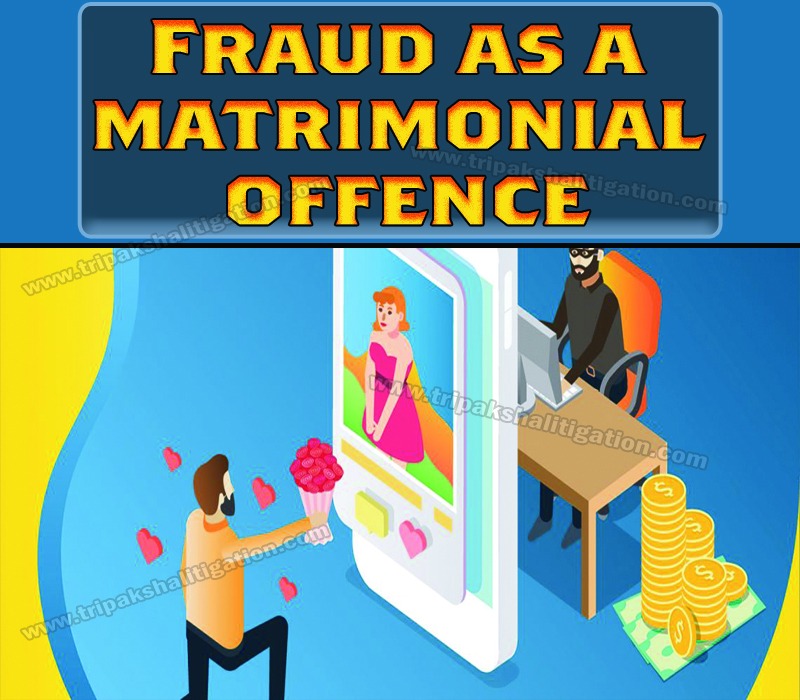The growths of Matrimonial Offences are rapidly increasing by each passing day, and we all are aware that in today’s era not only the women but also the men are equally facing these offences against themselves. Matrimonial offences are those offences which are committed by either of the spouse against each other. However, various provisions in the Indian Penal Code provide numerous Matrimonial protections and some of them apply to both the spouses.
Provisions for the offences Related to marriage are described as under:
Cohabitation by Fraud and Inducement
-
- Where men are not lawfully married to women but cause her to believe that she is lawfully married to men and cohabit or have sexual intercourse with her. Whereas when a man commits the offense of Mock Marriage it is the Cohabitation by Fraud and Inducement under section 493 of IPC. Under section 493 the person is punishable by imprisonment which can exceed up to 10 years and fine.
- To prove this offense it must be conclusively established that the men either fraudulently or dishonestly made a false statement intentionally, or conceal certain facts from a girl.
- 493 of IPC punish men who induce women to become concubine but make her think herself his wife. This offense is committed by a person who makes a women falsely believes that he is of same race or religion as her and even after knowing it clearly that such marriage is illegal in the eyes of law induces the women major or minor (as a matter of fact minor can be deceived more easily than adult) to marry him and also makes her believe that it will be a valid marriage. Calcutta High Court held that such offense committed under this section may also be punished as rape under section 375.
Bigamy
- When a person or either of the spouse is under the marriage obligation or having a living spouse, married to some other person during the life of such husband and wife commits the offense of Bigamy which is punishable with imprisonment which may extend up to seven years and shall also be liable to fine under section 494 of IPC.
- However, whose marriage is declared void by the Court of competent jurisdiction this section does not apply to any such person. Both the first and second marriage must be the valid marriage in the eyes of law to attract the provision of section 494 IPC.
- Gopal Lal Versus State of Rajasthan Supreme Court held that when spouse contracts a Second marriage while the first marriage is still subsisting the spouse become guilty of Bigamy under section 494 I.P.C only if it is proved that the second marriage is valid and all the necessary ceremonies or customs have been performed which are required by law.
- Section 17 of the Hindu Marriage Act, 1955 makes Bigamy among Hindus under section 494 and 495 I.P.C. Thus Bigamy between two Hindus will be Void if:
- Marriage is solemnized after the commencement of the Hindu Marriage Act.
- At the time of such marriage, either party had a living spouse.
-
- That accused will not be guilty of Bigamy if on the reasonable ground he believed that:
- His first marriage was void; or
- His wife was dead; or
- His first marriage has been dissolved or annulled.
- That accused will not be guilty of Bigamy if on the reasonable ground he believed that:
Fraudulent marriage or Unlawful marriage
- Who ever goes through the ceremony of marriage with the intention to conduct fraud, knowing that he is not thereby lawfully married shall be punished with the Imprisonment which may extend up to seven years and liable to fine Under Section 496 of I.P.C.
- Where the parties to the marriage, or any party to the marriage having the knowledge that no lawful marriage is constituted is the essence of the marriage under section 496 of IPC, where the prosecution must prove that it was in the knowledge of the accused that there was no valid marriage organized and he had gone through the marriage with the ulterior motives.
- A mere verbal depiction that a woman is married is sufficient and requires no form of symbolizing marriage under section 496 of IPC. However, this section does not require any cohabitation or sexual intercourse as a requirement whereas a fraudulent or dishonesty in the marriage ceremony is sufficient to fall under section 496 of IPC.
-
- Section 496 applies where the fake ceremony took place to pretend the valid marriage and such marriage would not constitute a valid marriage if:
- If the effect is sought to be given by the proceedings to some collateral fraudulent purpose.
- If any of the parties is deceived into the belief that it does not constitute a valid marriage.
- Section 496 applies where the fake ceremony took place to pretend the valid marriage and such marriage would not constitute a valid marriage if:
Enticing or taking away or detaining with criminal intent a married woman
Any person who takes away any woman whom he knows or has a reason to believe to be the wife of another man, with intent that she may have illicit intercourse with any person, or conceals or detains with that intent any such women, shall be punished with imprisonment which may extend to two years, or fine, or both men who have a sexual intercourse with a wife of any other man knowingly that she is a wife of other men has committed the adultery.
You may contact me for consultation or advice by visiting Contact Us and Call us


good information,legal subject